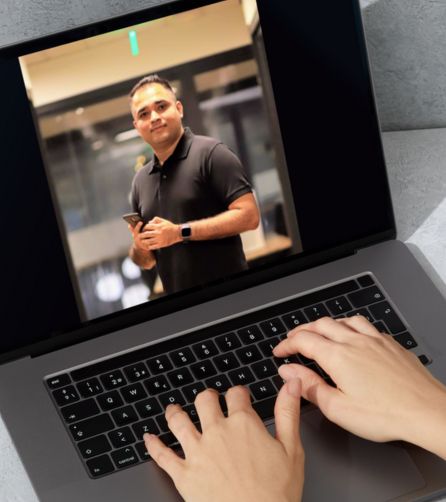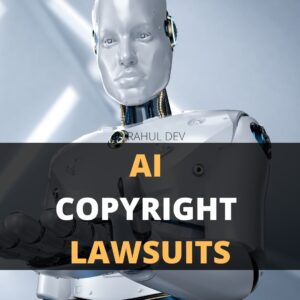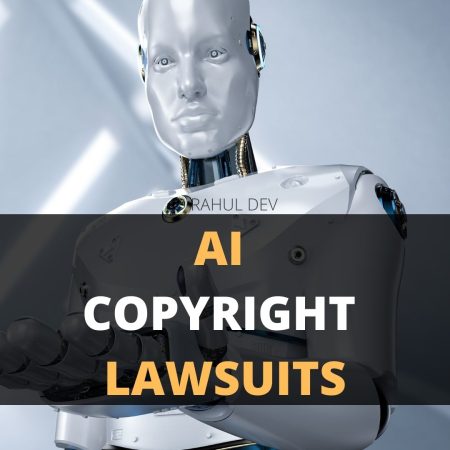AI Copyright Lawsuits
Explore the ongoing lawsuits involving AI and Copyright Law

Understand Legal Aspects
Understand how AI generated content can create business and legal issues

Explore the ongoing lawsuits involving AI and Copyright Law

Understand how AI generated content can create business and legal issues

Protect your innovations across multiple countries and create strong patent portfolio to boost business valuation
Local and global brand protection through international trademark registrations
Extensive research and business writing for technical whitepapers and B2B content products
The rise of Artificial Intelligence (AI) has been nothing short of revolutionary, impacting various sectors including business and law. Key players like OpenAI, Microsoft, and the Authors Guild are at the forefront of this transformation, but they also find themselves entangled in a web of legal complexities. Recently, the Authors Guild filed an infringement suit that has sent ripples across the industry. CEOs argue that a balance must be struck between innovation and safeguarding creators’ rights. Lawyers emphasize the need for legal frameworks that can adapt to the challenges posed by AI, such as determining authorship for AI-generated content.
As per reports, Author’s Guild, an organization that’s been championing the rights of writers since time immemorial, brought a class-action lawsuit on September 19 against OpenAI, the Microsoft-backed AI giant. According to the filed court documents, the premier professional organization for writers in the U.S. alleges OpenAI’s misuse of copyrighted material in the training of its AI models. In essence, OpenAI stands accused of “flagrant and harmful infringement” of registered copyrights in written works of fiction. The Guild took issue with the wholesale copying of copyrighted works into large language models (LLMs) without obtaining necessary permissions or consideration. With these algorithms acting as the lifeblood of OpenAI’s enterprise, the Guild has termed such actions as “systematic theft on a mass scale.”
The wave of copyright lawsuits, notably the infringement suit brought by the Authors Guild on September 19, poses significant risks for tech giants like OpenAI and Microsoft. These risks span from costly legal fees and potential settlement payments to reputational damage that could hinder AI technology development. Companies are advised to bolster their legal teams and implement stringent content moderation measures as mitigation strategies. Financially, diversifying revenue streams and setting up contingency funds can act as safeguards. Transparency, ethical practices, and clear communication with the public and content creators are also essential in navigating these complex legal waters.
This article covers following topics:
Potential Damage to Writers’ Livelihood
Similar Case Against Meta and OpenAI
Copyright Laws and AI-Generated Content
Is AI-generated content copyrightable?

Representing a class of professional fiction writers, the Author’s Guild is adamant that these actions constitute a direct threat to the livelihood of authors, whose income is often solely dependent on their creative literary works. The Guild has proposed alternative means AI models could be trained, such as using public domain works or paying a licensing fee for copyrighted content. The Guild’s contention lies in the unauthorized access of recent books, which it asserts violate the Copyright Act, to power OpenAI’s commercial ambitions. The Guild has been vocal in advocating for the protection of authors’ rights, especially in regards to AI technologies, and has even shared resources on this matter. In fact, just a week before the lawsuit, they posted an enlightening article about how authors can safeguard their work from AI web crawlers.
This development follows in the footsteps of a similar lawsuit opened in July by author Sarah Silverman and others against Meta and OpenAI. Both companies, however, have requested the court to dismiss these claims. Meanwhile, the U.S. Copyright Office has already started exploring issues related to AI content production and has sought public input. In a related ruling, U.S. District Judge Beryl Howell has stated that artwork created solely by AI does not qualify for copyright protection. To establish key guidelines and understand the impact of AI on copyright laws, it would be crucial to follow further updates on this case and how these developments might impact the intersection of AI and copyright law.
The evolution of AI in content creation has been rapid, raising ethical and legal questions. Technology ethicists stress the need to consider the ethical implications of AI applications in copyright disputes. Industry experts advocate for collaboration between corporations, researchers, and policymakers to navigate this complex landscape. The game has changed dramatically since AI made its first strides in content creation. Traditionally a human-centric domain, content creation has been revolutionised by AI’s ability to interpret data, learn from patterns, and generate fresh, insightful content at an unprecedented speed. This rapid evolution has not only transformed business operations but also raised ethical and legal questions.
Among the many debates that have ensued, the question of AI authorship stands out. Does an AI, capable of creating content, own the copyright to its creations? This question sends ripples through the realm of ethics, as delineating the boundaries of ownership becomes increasingly complex. Prominent technology ethicists have warned that ignoring these ethical implications could potentially lead to a drastic devaluation of human creativity, as AI systems become more sophisticated and creative in their output. Therefore, it is critical to address these ethical implications head-on. Alongside the ethical dilemmas, the legal landscape of AI in content creation is equally perplexing. In the current context, the law struggles to keep pace with the rapid advances of AI technology. This creates a gray area for copyright disputes involving AI-created content.
The rapid advancement of artificial intelligence (AI) capabilities has outpaced the development of legal frameworks to regulate its use. With generative AI now able to produce human-like creative works, thorny questions have emerged around copyright protections and infringement. For business leaders seeking to leverage AI while minimizing legal risk, the path forward remains cloudy. However, proactive monitoring of emerging case law, compliance best practices, and ethical considerations can chart a course through the murky waters where AI intersects with copyright law.
Recent high-profile lawsuits alleging AI-generated content infringes copyrights offer cautionary tales. In these cases, generative AI companies were accused of scraping copyrighted data to train models without permission. The resulting AI outputs were claimed to be derivative works infringing copyrights. Defendants argued AI has transformative fair use protections. With no definitive legal precedent, settlements were reached, leaving unresolved questions. These cases exemplify the legal uncertainties businesses now face in training and deploying generative AI.
While the courts continue wrestling with such issues, risks remain for enterprises that fail to enact robust copyright compliance practices for AI content creation. Specific best practices might include auditing training data sources for licensing compliance, adding copyright detection filters to AI outputs, and restricting distribution or usage based on assessed infringement risks. Implementing controls like these can help mitigate legal exposures.
Beyond strict legal considerations, companies should also proactively adopt ethical AI frameworks to address societal impacts. Principles such as transparency, accountability, bias prevention, and community benefit should shape the development of generative systems. For example, being transparent about data sourcing and potential biases built into models can foster trust. Taking accountability for harmful AI impacts demonstrates commitment to consumers. Prioritizing community voices when designing systems helps ensure inclusive innovation. Anchoring AI in such ethical underpinnings will lead to more conscientious outcomes.
The interplay between AI and copyright law remains messy and unsettled. While the courts slog towards consensus, enterprises must stay vigilant. Monitoring legal developments, implementing proactive compliance controls, and anchoring AI systems in ethical underpinnings can help businesses capitalize on generative AI’s vast potential while steering clear of infringement landmines. If guided by wisdom, AI can enhance creativity and expression in wondrous new ways, opening up possibilities we can only begin to imagine. But we must take care in how we chart this course to avoid pitfalls along the journey. With care and foresight, this murky path can lead to promising new horizons.
As artificial intelligence rapidly evolves to produce increasingly sophisticated creative works, novel legal questions arise around AI authorship and copyright ownership. Under current frameworks, works generated solely by machines are not entitled to copyright protections reserved for human creators. However, the legal landscape remains murky, leaving unsettled key issues around granting and enforcing AI copyrights.
At the core of debates about AI copyright is a fundamental tension. Copyright law aims to incentivize innovation by granting creators exclusive rights over original works. This encourages investment in cultural production and rewards ingenuity. Yet today’s machine learning systems are not sentient beings capable of responding to such incentives. Affording copyright to AI would grant monopolies without furthering underlying policy goals.
Additionally, AI authorship does not fit neatly within copyright law’s conceptual paradigm. Works must be original creations reflecting human personality to qualify for protection. But AI systems are designed to iteratively learn by ingesting data, not self-express. Their outputs reflect programmed architecture more than an inner muse. Calls to recognize AI authorship thus confront foundational questions about copyright’s purpose in promoting human flourishing. Assuming legislative reforms ever grant copyright to AI systems, thorny questions around enforcement would still remain. Copyright formalities like registration and litigation require legal personhood only natural persons or corporations can presently claim. Reallocating rights to technology without capacity to exercise them would necessitate a radical legal overhaul.
For now, companies investing in generative AI must rely on trade secret protections and contractual rights to secure value from machine creations. However, rapid technological change may pressure lawmakers to bridge the gap between emerging innovation and antiquated frameworks. The future legal status of AI copyright remains uncertain. But for the time being, machine authorship falls into a gray area where creativity outpaces regulation.
As artificial intelligence becomes increasingly adept at producing creative works, uncertainty swirls around the copyright eligibility of machine-generated content. While consensus holds that current copyright law does not protect works authored solely by AI, nuances in this emerging area leave room for ongoing legal disputes. At the core of debates around AI copyrightability is the doctrine of originality. Copyright protects only original works reflecting human creativity and expression. AI systems using data models to iterate content do not qualify. Their outputs are not products of intellectual imagination, but rather reflective of statistical computations and training data. Granting copyright on this basis would constitute a seismic shift in legal doctrine.
However, questions arise when AI collaboration with humans occurs. If a programmer significantly contributes creative decisions impacting AI outputs, this may impart the originality needed for copyrightability. Yet parsing creative human contributions from machine processes poses challenges. The level of human involvement required remains unclear, with little legal guidance.
Another consideration is an AI system’s ability to evolve independently after initial programming. If ongoing autonomous learning produces novel output, does this qualify as original AI expression? Again, current frameworks provide no clear answers. While most experts maintain AI works still fall outside copyright protections, rapid technological change may pressure new legislation. Yet radical paradigm shifts seem unlikely in the near future. For now, businesses using AI content creation must rely on contracts and trade secrets, not copyright law, to secure competitive advantages. AI-generated content remains ineligible for copyright absent meaningful human authorship. But as AI capabilities continue advancing, debates around legal protections will persist. Though consensus currently rejects AI copyrightability, expect ongoing disputes as technology strains traditional frameworks.

As a business coach and thought leader, I cannot emphasize enough the importance of innovation, new software patents, mobile apps, and patents for tech companies, startups, and entrepreneurs. The world is rapidly evolving, and staying ahead of the curve is vital for success. Embracing technological advancements such as blockchain and AI can unlock unprecedented opportunities, streamline operations, and propel businesses into the future with competitive valuation via intangible assets.
Click Here for AI Startup Valuation Guide.
For instance, blockchain technology can revolutionize supply chain management and secure data sharing wherein innovative business models are explained to the audience via technical whitepapers, while AI can automate and optimize decision-making processes. Mobile apps are no longer just a luxury; they have become essential tools for engaging customers and offering personalized experiences. Furthermore, securing digital innovation patents is crucial for protecting intellectual property, fostering innovation, and maintaining a competitive edge. By investing in these areas, businesses can position themselves as industry pioneers and pave the way for a prosperous future after thoroughly conducting the due diligence and reviewing the legal opinion letters, which in case of digital assets can assist in determining the tokens as utility assets or coins as utility tokens before listing the assets at an exchange.
Our team of advanced patent attorneys assists clients with patent searches, drafting patent applications, and patent (intellectual property) agreements, including licensing and non-disclosure agreements. Advocate Rahul Dev is a Patent Attorney & International Business Lawyer practicing Technology, Intellectual Property & Corporate Laws. He is reachable at rd (at) patentbusinesslawyer (dot) com & @rdpatentlawyer on Twitter.
Quoted in and contributed to 50+ national & international publications (Bloomberg, FirstPost, SwissInfo, Outlook Money, Yahoo News, Times of India, Economic Times, Business Standard, Quartz, Global Legal Post, International Bar Association, LawAsia, BioSpectrum Asia, Digital News Asia, e27, Leaders Speak, Entrepreneur India, VCCircle, AutoTech).
Regularly invited to speak at international & national platforms (conferences, TV channels, seminars, corporate trainings, government workshops) on technology, patents, business strategy, legal developments, leadership & management.
Working closely with patent attorneys along with international law firms with significant experience with lawyers in Asia Pacific providing services to clients in US and Europe. Flagship services include international patent and trademark filings, patent services in India and global patent consulting services.
Global Blockchain Lawyers (www.GlobalBlockchainLawyers.com) is a digital platform to discuss legal issues, latest technology and legal developments, and applicable laws in the dynamic field of Digital Currency, Blockchain, Bitcoin, Cryptocurrency and raising capital through the sale of tokens or coins (ICO or Initial Coin Offerings).
Blockchain ecosystem in India is evolving at a rapid pace and a proactive legal approach is required by blockchain lawyers in India to understand the complex nature of applicable laws and regulations.